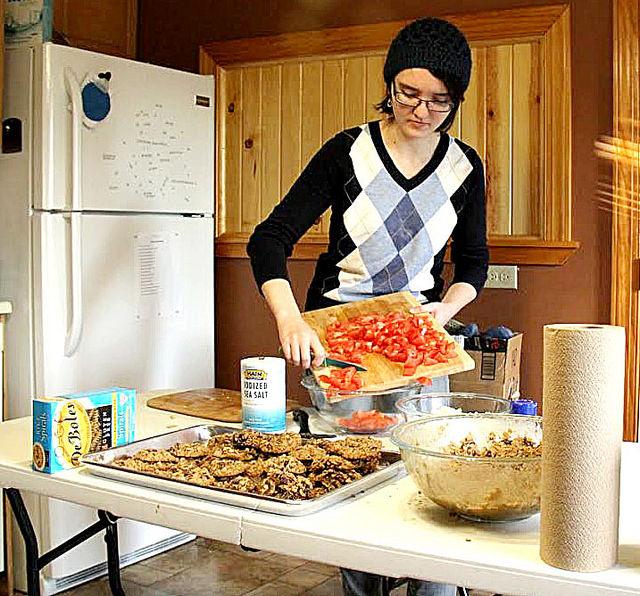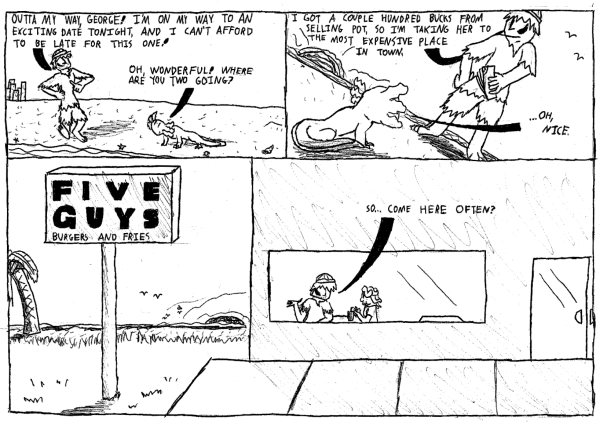Food Co-op invites students to its table
Cara Brosius, ‘16, is preparing food for the dinner on Friday, Oct. 24 in the Food Co-op House.
Since the fall semester of 2013, students have had a new meal option in Carr Hall on every Friday evening, besides traditional Brooks Dining Hall and McKinley’s Food Court.
This new option is the Food Co-op sponsored and organized by students, and was started by Taylor Hinton, an Environmental Studies graduate, ’14, as her senior comp focusing on sustainable and meaningful sharing of food.
The Food Co-op has attracted students with food allergies and dietary restrictions, vegetarians who found the vegetarian options of campus meals are limited, and students who simply want to have local, homemade food.
At the end of last semester, Hinton worked with the Office of Residence Life to propose for a living space where students could cook and share food together.
She was then approved for a house on North Main Street, and her project was passed on to Cara Brosius, ’16, Hawk Weisman, ’16, and Stephanie Latour, ’16, who currently live together in the Co-op House. Starting two weeks ago, the co-op began to host dinners on Friday evenings in their house instead of Carr Hall.
“I have always liked cooking ever since I was little. I liked to bake things with my mom,” said Brosius, the current organizer of the Food Co-op. “And living in the campus housing, you know there aren’t very accessible kitchens, so when I found out there is an opportunity of live in this house last semester, I took it.”
“I grew up cooking every day and it was a big part of my life and having another group of people to share that just feels like home. We want it to be a place that people can share their food culture,” said Weisman, who is currently in charge of the money of the Food Co-op.
According to Brosius and Weisman, students could sign up on a Google Spreadsheet to be the head chefs for meals and would plan on what to buy or make. Other students can volunteer to be shoppers for ingredients and sous chefs for preparation. The Food Co-op asks for a donation from $3 to $5 every meal or $20 to cover all meals throughout the semester.
“It’s a really cool idea that it keeps people together with great food for really reasonable price for everybody, unlike some of the meal plans at the school,” said KJ Sweet, ’16. “It’s a good place to be and it’s a very friendly environment.”
“They make gluten free options available so I can eat here. I think it’s a good opportunity for students and that’s a good community experience,” said Catherine LeBlanc, ’17, who has been to the co-op for a few meals.
“I do think that I’ve had much improvement of my weird digestive systems ever since coming here, being able to cook my own food and eating healthier. That’s what I was interested in mainly, for my health,” said Brosius.
Brosius and Weisman have a lot of visions for the Food Co-op and they set Oberlin College as the model, where there is a food co-op system with a number of houses and students living there rotate to serve dinner every night. “It’s like living in North Villages, but students can pay for the co-op instead of a meal plan,” said Brosius. “I wish we could have more options with our meal plans that we could pay into the college but it’s actually going to be for this homemade food. Co-op could be a meal plan that could be grown on campus.”
“We could be there maybe not by the time I graduate but in another 10 years, if we could grow that much, it would be great,” said Weisman.
The Food Co-op hopes to make more impacts by getting new members and expanding the group. It is looking for opportunities to collaborate with other student groups on campus, especially diversity groups like A5 and Union Latino. The co-op is recently planning to reach out clubs for events at the end of this semester.
“It could be like a means of cultural exchange, a place people sharing what’s traditional in their family,” said Weisman.








